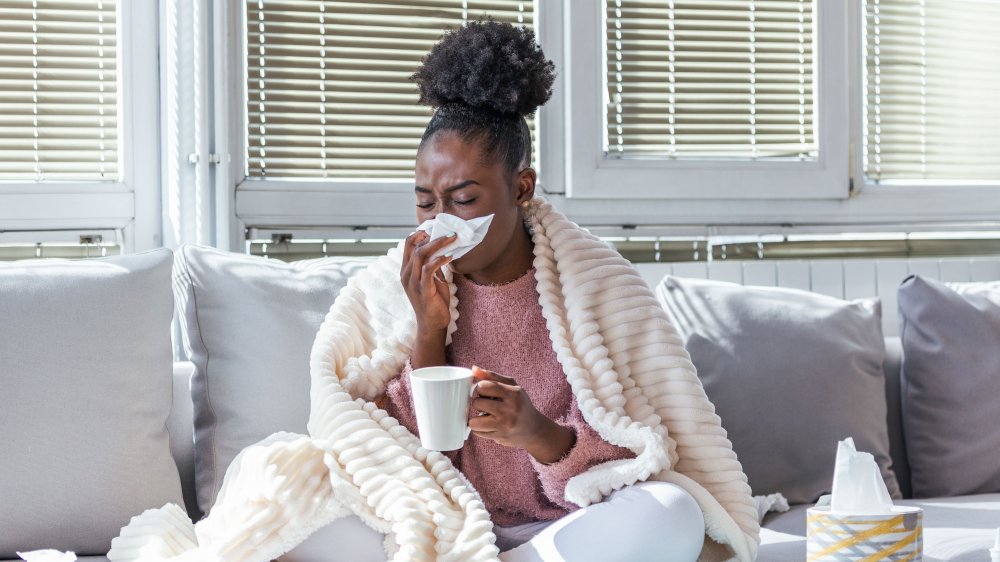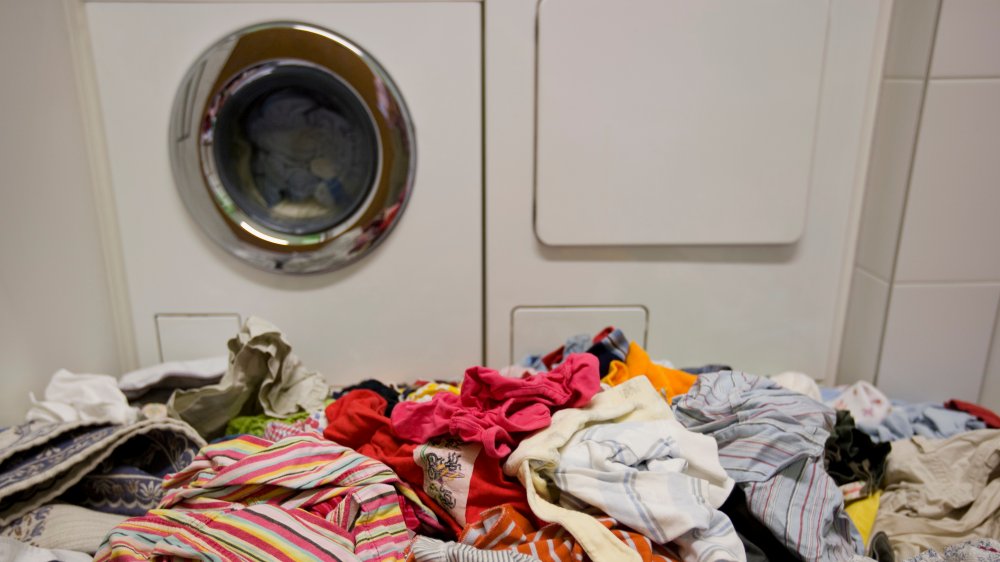Can Coronavirus Live On Your Clothes?
Yes, germs can live on your clothes and body, too. While this may not be the most buzzworthy conversation topic about transmission, it's important to take precautions where we can. The UK's National Health Services states there are three primary ways germs can be spread by clothes and towels: Shared towels or bedding can spread contamination, dirty laundry can spread germs when handled, and the laundering process itself can spread germs.
While much of the guidance for coronavirus revolves around hard surfaces and high-touch surfaces — like your cell phone — the CDC also implies a risk when handling the clothes or bedding of an infected person. The organization recommends that you wear gloves when processing laundry for a person sick with COVID-19 and discard these immediately after use. Caretakers should then wash hands properly after handling. The organization further reminds people not to "shake" the laundry while cleaning to avoid the risk of further spreading any germs or viruses, and follow up by cleaning and disinfecting any hampers or laundry collection devices that have been used.
So how do we avoid spreading contamination?
Can coronavirus jump?
Coronavirus is contagious, but thankfully it doesn't know how to jump like lice or fleas. Although while the virus itself doesn't have legs, the World Health Organization describes how these pests have also been known to carry disease (think plague) so it's always a good idea to avoid that risk anyway. When experts describe the coronavirus "jumping," they are referring to the mutation that causes an otherwise benign virus to mutate and move from animals to make humans sick through the infiltration of their cells as described in Quanta Magazine. Instead, humans are the main source of worry.
While the virus can't jump without help, it can be spread through coughs, sneezes, or socially-awkward speaking (say it, don't spray it). A single cough can produce up to 3,000 droplets and these droplets of virus can live for several days on hard surfaces like metal, glass, or plastic. There's even evidence that the virus may have the potential to stay alive in the air, as researcher Jamie Lloyd-Smith of UCLA told NPR. However, NPR noted, "Lloyd-Smith says this experiment definitely does not prove that people have been infected this way by particles of virus that float in the air, what scientists call aerosolized transmission. He says what remains unknown is what dose is needed to infect someone." So while this novel flu virus may not be able to jump, it's important to practice social distancing and sanitization.
Distance helps prevent virus transmission
If you must interact with people in public, social distancing is the best option you have right now. Johns Hopkins Medicine explains the concept as creating physical space between people to avoid virus transmission. When in public, stay at least 6 feet away from others, and don't greet by touching, such as a high five or handshake. Further measures suggested include simply not going out in public if possible, working from home, ordering groceries in, communicating digitally instead of in-person. If you aren't part of an essential service provider like food delivery, medicine, fire, or other services — it's best to simply stay home. The CDC reminds us that person-to-person transmission is the primary way this virus spreads — so basically, don't touch other people. At least, people who aren't in your household.
Masks are not recommended for the general public, and should only be used if caring for an infected person or by a medical professional, as there is a critical shortage of personal protective equipment for medical providers right now. The WHO provides further guidance for those who need to know proper mask-wearing procedure.
More tips for disinfecting cloth and clothing during the coronavirus outbreak
Unfortunately, virus concerns make that large laundry pile even more pressing. If you have been out in public near at-risk persons or exposed to a person suspected of having coronavirus, take precautions now. The NHS further recommends that germs and viruses require disinfecting, recommending you wash in water of at least 140 degrees Fahrenheit, and use a bleach-based product (available in most laundry aisles). The CDC adds further guidance on cleaning, reminding everyone to let these laundered items dry fully.
For other soft surfaces in the house, such as furniture and carpet, follow a similar process with gloves. First, clean with detergent and water, then follow up with a disinfectant. Typical disinfectants with a diluted bleach mix or at least 70 percent alcohol in solution and EPA-approved antiviral products are expected to work well for this type of cleanup. As a reminder, never mix chemicals, such as bleach and ammonia, and as unknown cleaners may cause bleaching or discoloration on furniture, use caution before applying to a large area.



